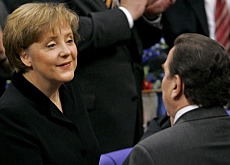
German stability should boost Swiss economy

Switzerland's economic recovery will be boosted by the appointment of Angela Merkel as German Chancellor, says the Swiss Business Federation, economiesuisse.
Merkel was sworn in as head of a coalition government on Tuesday, ending weeks of uncertainty for Switzerland’s biggest trading partner after September’s inconclusive general election.
She became Germany’s first ever woman chancellor with the Christian Democrat-Social Democrat coalition winning 397 of the 614 seats in the German parliament. However, 51 members of the coalition voted against her appointment.
Swiss President Samuel Schmid congratulated Merkel on behalf of the federal government in Bern. He expressed the hope that the excellent relations between Switzerland and Germany would be strengthened even more.
Economiesuisse chief economist Rudolf Walser told swissinfo that the return of stability in Germany should have a positive effect on Switzerland.
“It is good news that Germany has a new government with a programme focussing on crucial economic reforms,” he said. “It is important that the vacuum that has reigned in the past two months has been overcome.”
“This will positively influence Switzerland due to the weight of trade between the two countries. It will strengthen confidence among consumers and investors in Switzerland that the recovery already underway here will continue in 2006.”
Big business
Germany accounts for 20 per cent of all Swiss exports and a third of imports come from German businesses. Furthermore, one in three foreign hotel guests are German customers.
Some political commentators fear that the new coalition government, made up of Merkel’s conservative Christian Democrat (CDU) party and former Chancellor Gerhard Schröder’s Social Democrats (SPD), will not last.
For his part, Walser admits that the partnership between the traditional rival parties may take some time to bed in but believes it is the best option for stability in Germany, given the lack of alternatives.
“There are uncertainties and of course there are some risks in this coalition, but one should give the new government a chance,” he said.
Walser also believes that the economic reforms agreed by the coalition should be enough to stimulate Germany’s underperforming economy, despite the fact that the CDU were forced to water down their proposals in order to strike a deal with the SPD.
The key areas of reform focus on personal and business taxation, creating more flexibility in the labour market and reforming the federalist structure.
“The reforms do not go quite as far as I would have liked, but they are going in the right direction,” he said.
“It is more or less a clear programme and that should boost consumer confidence in Germany.”
swissinfo, Matthew Allen
Angela Merkel is Germany’s first woman chancellor and also the first leader from the former eastern Germany.
Her appointment was made after the Christian Democrats and Social Democrats agreed to form an alliance.
Germany’s general election ended in stalemate on September 18 with voters unable to decide on a clear winner.

In compliance with the JTI standards
More: SWI swissinfo.ch certified by the Journalism Trust Initiative










































You can find an overview of ongoing debates with our journalists here . Please join us!
If you want to start a conversation about a topic raised in this article or want to report factual errors, email us at english@swissinfo.ch.